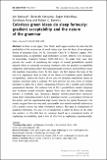Colorless green ideas do sleep furiously: gradient acceptability and the nature of the grammar
Author(s)
Sprouse, Jon; Yankama, Beracah; Yankama, Beracah; Indurkhya, Sagar; Fong, Sandiway; Berwick, Robert C; ... Show more Show less
DownloadPublished version (2.563Mb)
Terms of use
Metadata
Show full item recordAbstract
In their recent paper, Lau, Clark, and Lappin explore the idea that the probability of the occurrence of word strings can form the basis of an adequate theory of grammar (Lau, Jey H., Alexander Clark & 15 Shalom Lappin. 2017. Grammaticality, acceptability, and probability: A prob- abilistic view of linguistic knowledge. Cognitive Science 41(5):1201-1241). To make their case, they present the results of correlating the output of several probabilistic models trained solely on naturally occurring sentences with the gradient acceptability judgments that humans report for ungrammatical sentences derived from roundtrip machine translation errors. In this paper, we first explore the logic of the Lau et al. argument, both in terms of the choice of evaluation metric (gradient acceptability), and in the choice of test data set (machine translation errors on random sentences from a corpus). We then present our own series of studies intended to allow for a better comparison between LCL's models and existing grammatical theories. We evaluate two of LCL's probabilistic models (trigrams and recurrent neural network) against three data sets (taken from journal articles, a textbook, and Chomsky's famous colorless-green-ideas sentence), using three evaluation metrics (LCL's gradience metric, a categorical version of the metric, and the experimental-logic metric used in the syntax literature). Our results suggest there are very real, measurable cost-benefit tradeoffs inherent in LCL's models across the three evaluation metrics. The gain in explanation of gradience (between 13% and 31% of gradience) is offset by losses in the other two metrics: a 43%-49% loss in coverage based on a categorical metric of explaining acceptability, and a loss of 12%-35% in explaining experimentally-defined phenomena. This suggests that anyone wishing to pursue LCL's models as competitors with existing syntactic theories must either be satisfied with this tradeoff, or modify the models to capture the phenomena that are not currently captured.
Date issued
2018-09Department
Massachusetts Institute of Technology. Department of Electrical Engineering and Computer ScienceJournal
Lingustic Review
Publisher
Walter de Gruyter GmbH
Citation
Sprouse, Jon et al. "Colorless green ideas do sleep furiously: gradient acceptability and the nature of the grammar." Linguistic Review 35, 3 (September 2018): 575–599 © 2018 Walter de Gruyter
Version: Final published version
ISSN
0167-6318
1613-3676